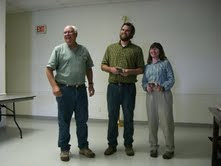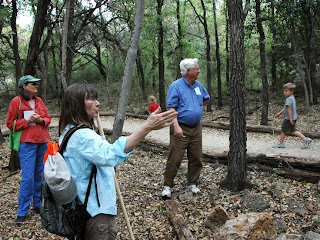Texas Invasives Class Benefits Natural Areas
 SMGA, the Hays County Extension office, and the Hays County Master Naturalists sponsored a training session February 26th in San Marcos to learn more about invasive plants and their safe removal and replacement with native plants. Thirty students from around the country, including six SMGA members, spent their Saturday learning from Travis Gallo, a specialist on Texas invasives, based at the Lady Bird Johnson Wildflower Center. The curriculum included identifying , recording locations via GPS, and adding to a statewide database that tracks the spread of invasives. The database is shared nationally. (In photo above, Lance Jones presents Travis Gallo and Minnette Marr with a token of appreciation for educating Citizen Scientists about invasive plants. Photo by Dick McBride.)
SMGA, the Hays County Extension office, and the Hays County Master Naturalists sponsored a training session February 26th in San Marcos to learn more about invasive plants and their safe removal and replacement with native plants. Thirty students from around the country, including six SMGA members, spent their Saturday learning from Travis Gallo, a specialist on Texas invasives, based at the Lady Bird Johnson Wildflower Center. The curriculum included identifying , recording locations via GPS, and adding to a statewide database that tracks the spread of invasives. The database is shared nationally. (In photo above, Lance Jones presents Travis Gallo and Minnette Marr with a token of appreciation for educating Citizen Scientists about invasive plants. Photo by Dick McBride.)
Texas invasives include chinaberry, ligustrum, nandina, yellow star thistle, Chinese tallow, insects, aquatic plants, and even animals like nutria. Invasives persist and spread due to a lack of natural predators, competitors, or diseases that normally regulate their populations. Invasive plants crowd out native plants and fundamentally change ecosystems. Ligustrum groves block out sunlight and prevent protective ground cover like mallow or grasses from growing underneath. Chinaberry and nandina spread by birds eating the seeds and then depositing them along fence and power lines. Many invasive plants are introduced by landscapers and nurseries to bring attractive, flowering plants to local yards.
A focus of this year’s SMGA / Bobcat Build project on 4/9 is removing
 |
|
| Minnette Marr explains karst features (Photo by Lance Jones) |
ligustrum from a 9-acre portion of lower Purgatory Creek Natural Area. Planning, documentation, and removal will increase watershed protection and water capture and enhance public viewing and use of the natural area. Minnette Marr a plant conservationist and San Marcos resident advised SMGA members in the removal of ligustrum and replacement with Texas native plants. This multi-year effort will improve natural areas that are critical to the capture of rainwater runoff.

